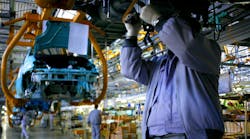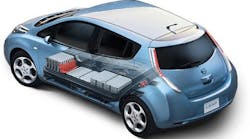The quest to develop a more cost-effective combination of onside power generation and storage got a new and competitive option this week with the introduction of used batteries from plug-in electric cars as a storage technology. The idea has been around for years, that used electric vehicles with batteries that no longer have the surge of power to drive a car but can still cycle significant electricity. Now Nissan is partnering up to make the idea a reality.
Commercial energy storage firm Green Charge Networks, Santa Clara, Calif., said it’s partnering with Nissan Motor Co. to use “second-life” (i.e., used) batteries from the company’s Leaf plug-in hybrid and other Nissan electric vehicles to develop an offering for stationary commercial energy storage in U.S. and offshore markets.
Nissan has sold more than 178,000 of its Leaf car since its launch in late 2010, and established a join-venture with Sumitomo Corp. in 2010 called 4R Energy to conduct research projects in Japan, the U.S. and Europe that use Leaf batteries outside the vehicle. In a new stationary storage application powered by Green Charge’s intelligent software and Power Efficiency Agreement, Green Charge says the second-life energy storage unit has a cost advantage over traditional units, opening up new markets where incentive programs are currently not offered.
Engineering teams from both companies have worked together for more than a year to ensure safety, reliability and performance of this offering for commercial customers, Green Charge said. The first combined storage unit will be installed at a Nissan facility this summer, where multiple Nissan Leaf batteries will be configured to offset peak electricity demand, creating savings while also benefiting the utility grid. Systems like this also can be paired with renewable energy sources such as wind or solar to further reduce a facility’s environmental footprint and enhance energy savings.
“A lithium-ion battery from a Nissan LEAF still holds a great deal of value as energy storage, even after it is removed from the vehicle, so Nissan expects to be able to reuse a majority of LEAF battery packs in non-automotive applications,” said Brad Smith, director of Nissan’s 4R Energy business in the U.S. “Nissan looks forward to working with Green Charge Networks to get second-life vehicle batteries into the hands of customers who can realize benefits that include improved sustainability and lower energy costs.”









